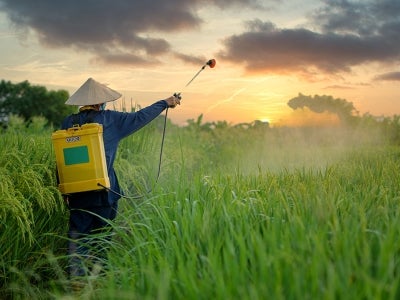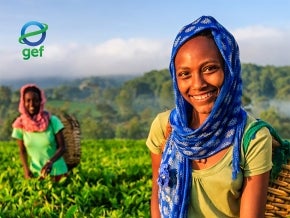Pacific countries made major strides towards realizing the vision of the Cleaner Pacific 2025 today, with the launch of ISLANDS Pacific – a 14-nation initiative aiming to avoid the release of 28,000 tonnes of marine litter, safely dispose of 720 tonnes of contaminated material, and reduce the burden of persistent organic pollutants (POPs) and mercury in island communities.
ISLANDS Pacific will strengthen existing regional efforts to #BeatPollution, through support for container deposit legislation and improved recycling efforts, as well as building capacity for lifecycle management of key waste streams, including end-of-life vehicles, used hydraulic oil and e-waste – with special attention placed on providing opportunities for women in recycling operations.
“ISLANDS Pacific provides an incredible opportunity for Samoa,” Hon. Toeolesulusulu Cedric Schuster Samoa’s Minister of Tourism and Natural Resources and Environment said.
“As part of ISLANDS’ commitment to piloting innovative solutions across the region, Samoa will be the location for a remaking and repairing workshop for electronic household goods. By doubling the life of electronic products, the amount of electronic waste can be reduced by half. Through GEF ISLANDS the Government of Samoa will work with the Samoan community to make this a reality.”
ISLANDS Pacific supports the implementation of the Pacific waste and pollution management strategy, Cleaner Pacific 2025, as well as the Waigani Convention to Ban the Importation into Forum Island Countries of Hazardous and Radioactive Wastes and to Control the Transboundary Movement of Hazardous Wastes within the South Pacific Region, the Basel, Rotterdam and Stockholm (BRS) conventions, the Minamata Convention on Mercury and achieving global commitments made under the Samoa Pathway.
The project includes the Cook Islands, Fiji, Federated States of Micronesia, Marshall Islands, Kiribati, Palau, Papua New Guinea, Nauru, Niue, Samoa, Solomon Islands, Tonga, Tuvalu, and Vanuatu. It benefits from $20 million from the Global Environment Facility and over $90 million in co-financing from other partners. The project is led by the UN Environment Programme under the $515 million Implementing Sustainable Low and Non-Chemical Development in Small Island Developing States (ISLANDS) project.
ISLANDS will share knowledge from regional projects, including ISLANDS Pacific, through the upcoming ISLANDS platform (gefislands.org) and convenes global communities of practice on key waste management challenges for SIDS on the Green Forum – including on e-waste, used oil, end-of-life vehicles (ELVs), mercury, and plastics.
This piece was originally published on the Green Growth Knowledge Platform.
About ISLANDS
The Implementing Sustainable Low and Non-Chemical Development in Small Island Developing States (ISLANDS) program is a $515 million, five-year initiative backed by the Global Environment Facility (providing $61 million) and partners, and implemented with the support of the United Nations Environment Programme (UNEP), United Nations Development Program (UNDP), Food and Agriculture Organization of the United Nations (FAO) and the Inter-American Development Bank. Participating countries include: Antigua and Barbuda, Bahamas, Barbados, Belize, Cabo Verde, Cook Islands, Cuba, Dominica, Dominican Republic, Federated States of Micronesia, Fiji, Guinea-Bissau, Guyana, Kiribati, Maldives, Marshall Islands, Mauritius, Nauru, Niue, Palau, Papua New Guinea, Saint Kitts and Nevis, Saint Lucia, Samoa, São Tomé and Príncipe, Seychelles, Solomon Islands, Suriname, Tonga, Trinidad and Tobago, Tuvalu, Union of Comoros, and Vanuatu.
About the Global Environment Facility
The Global Environment Facility is the largest multilateral fund focused on enabling developing countries to invest in nature and supports the implementation of international environmental conventions on biodiversity, climate change, chemicals, and desertification. Since 1991, it has provided more than $21.7 billion in grants and blended finance, and mobilized an additional $119 billion in co-financing for more than 5,000 projects and programs. Through its Small Grants Programme, the GEF has provided support to more than 26,000 civil society and community initiatives in 135 countries.
About SPREP
The Secretariat of the Pacific Regional Environment Programme (SPREP) provides assistance and promotes regional cooperation for the protection of the environment and sustainable management of natural resources. It was established in 1993, building on a joint initiative of the Pacific Community (SPC), South Pacific Bureau for Economic Cooperation (SPEC), United Nations Economic and Social Commission for Asia and the Pacific (UNESCAP) and United Nations Environment Programme (UNEP) and now serves as a component of UNEP’s Regional Seas Programme. SPREP is headquartered in Apia, Samoa with offices in Fiji, the Republic of the Marshalls Islands and Vanuatu.
About UN Environment Programme
UN Environment Programme is the leading global voice on the environment. It provides leadership and encourages partnership in caring for the environment by inspiring, informing, and enabling nations and peoples to improve their quality of life without compromising that of future generations. UN Environment Programme works with governments, the private sector, civil society and with other UN entities and international organizations across the world.
For more information, contact:
Joshua Sam, Hazardous Waste Management Adviser, Secretariat of the Pacific Regional Environment Programme (SPREP): joshuas@sprep.org
Ludovic Bernaudat, Senior Task Manager, United Nations Environment Programme: ludovic.bernaudat@un.org


